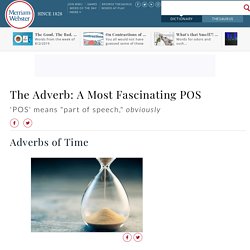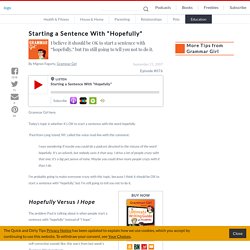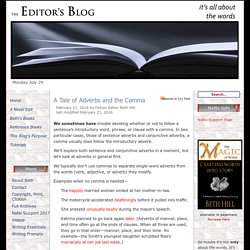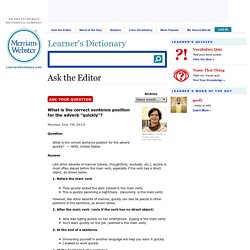

Yet again (phrase) definition and synonyms. The Adverb: A Most Fascinating POS. Adverbs are the chameleons of grammar.

They usually modify verbs, but they can also modify adjectives, other adverbs, phrases, and even entire sentences. They are magical, and they are, of course, categorized. Now let's roll. Adverbs of time answer the questions when? , for how long? It rained yesterday. Here are a few more: Nowadays it's different. There's something distinctive about that second group: they end in s. The history of adverbs like nowadays starts with the genitive. In Old English, the genitive was shown with es. This is how modern English came to have -s as a suffix used to form adverbs that denote usual or repeated action or state, as in nowadays et al.
How to Use Either, Neither, Or and Nor. Have you ever had difficulties knowing when to use either and neither?

How about nor and or? If you have, don't worry, you are not the only one. Even native speakers will sometimes get things like this confused! When you learn English, it helps to know little grammar tricks that help you tell the difference between words like these. Either and neither can be used in several ways: adverbs, determiners, pronouns and conjunctions. While 'either' has a positive connotation, 'neither' holds a negative significance.
Functions of Adverbs. Starting a Sentence With "Hopefully" Grammar Girl here.

Today's topic is whether it’s OK to start a sentence with the word hopefully. Paul from Long Island, NY, called the voice-mail line with this comment: I was wondering if maybe you could do a podcast devoted to the misuse of the word hopefully. It's an adverb, but nobody uses it that way. I drive a lot of people crazy with that one; it's a big pet peeve of mine. I'm probably going to make everyone crazy with this topic, because I think it should be OK to start a sentence with “hopefully,” but I'm still going to tell you not to do it. Hopefully Versus I Hope The problem Paul is talking about is when people start a sentence with “hopefully” instead of “I hope.” If you've ever heard me give a radio interview, you've probably heard me self-correct this problem. Hopefully...we hope. I don't mean to pick on the speaker here—as I said, I do this a lot. Hopefully [Oh no!
List of 100 Adverbs. Developing a list of 100 adverbs may be difficult since the adverb is one of the very most absolutely, positively, completely, totally and truly confused parts of speech in the English language.

You see, adverbs are often confused with adjectives. It's a relatively simple mistake to make, as both adjectives and adverbs describe things. This article will give you a list of 100 adverbs plus a brief summary of the difference between adverbs and adjectives. Sentence Adverbs and Commas. February 21, 2016 by Fiction Editor Beth Hill last modified February 21, 2016 We sometimes have trouble deciding whether or not to follow a sentence’s introductory word, phrase, or clause with a comma.

In two particular cases, those of sentence adverbs and conjunctive adverbs, a comma usually does follow the introductory adverb. We’ll explore both sentence and conjunctive adverbs in a moment, but let’s look at adverbs in general first. We typically don’t use commas to separate single-word adverbs from the words (verb, adjective, or adverb) they modify. Examples when no comma is needed— The happily married woman smiled at her mother-in-law. The motorcycle accelerated deafeningly before it pulled into traffic. She sneezed unusually loudly during the mayor’s speech. Katrina planned to go back again later. What is the correct sentence position for the adverb quickly? What is the correct sentence position for the adverb quickly?

— rlk95, United States Like other adverbs of manner (slowly, thoughtfully, excitedly, etc.), quickly is most often placed before the main verb, especially if the verb has a direct object, as shown below. 1. Before the main verb They quickly locked the door. However, like other adverbs of manner, quickly can also be placed in other positions in the sentence, as shown below. 2. Jane was typing quickly on her smartphone. Adverbs and adverb phrases: position. We can put adverbs and adverb phrases at the front, in the middle or at the end of a clause. The front position of the clause is the first item in the clause: Suddenly I felt afraid. Yesterday detectives arrested a man and a woman in connection with the murder.
The end position of the clause is the last item in the clause: Why do you always have to eat so fast? The mid position is between the subject and the main verb: Apples always taste best when you pick them straight off the tree.
BBC Learning English - Course: lower intermediate / Unit 14 / Session 2 / Activity 3. Adverbs in English. Adverbs in English - Learn All About English Adverbs. 10 Minute English Grammar: Word Order with Adverbs. Comparatives grammar animation. Adverbs. Adverbs of degree (Intensifiers and Mitigators) Adverbs. Learning English. Adverbs of manner. Adverbial phrase at DuckDuckGo. GRAMMAR: Putting adverbs in the right place. GRAMMAR: Putting adverbs in the correct place. BBC Learning English - Course: intermediate / Unit 15 / Session 2 / Activity 2. BBC Learning English - Course: intermediate / Unit 15 / Session 2 / Activity 1. A2 Grammar: Adverbial phrases of frequency, time and place.
Adverbs in English. BBC Learning English - Course: intermediate / Unit 15 / Session 2 / Activity 3.
BBC Learning English - Course: intermediate / Unit 19 / Session 2 / Activity 1. BBC Learning English - Course: intermediate / Unit 19. BBC Learning English - Course: intermediate / Unit 19 / Grammar Reference. Adverbs and adverb phrases: position. Adverbs: types. BBC Learning English - Course: intermediate / Unit 19 / Session 2 / Activity 3. Definition of well in English by Oxford Dictionaries. Position of adverbs. Skillswise - Adverbs. English Grammar Today on Cambridge Dictionary. COMMON adverbs IN ENGLISH at DuckDuckGo. Straight (adverb) definition and synonyms. Straight (adverb) definition and synonyms. Right (adverb) definition and synonyms.